Indie Books Add Voices of Immigrants
Immigrant: a person who comes to live permanently in a foreign country. America has been a place of immigrants longer than it has been the United States of America. Immigrants were on the Mayflower. Immigrants built new lives here and their children built our government. And now, we have immigrants who still want to come to the land of the free. Our rhetoric on immigration has changed since people landed at Plymouth Rock. Let’s add the voices of immigrants into the discussion.
Village of Immigrants: Latinos in an Emerging America
Diana R. Gordon 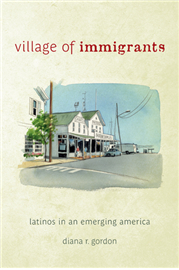
Rutgers University Press
Hardcover $23.53 (256pp)
978-0813575902
Immigrants are said to be responsible for many things these days, but we will not dwell on the ugly immigrant blame game built up by some political candidates. Instead, let’s focus on what we know immigrants are responsible for: a reinvigorated economy in small-town America. Yes, that’s correct, despite what you might hear from political candidates who are allegedly good businesspeople. It’s what Diana Gordon discovered when the CUNY professor retired to the Long Island community of Greenport, population 2,200—about one-third of them Hispanic. Rip them from their communities and send them “back where they came from,” and the result will be economic ruin for the small American towns they call home. Gordon’s new book, Village of Immigrants: Latinos in an Emerging America, tells the story of how immigrants, even undocumented ones, have become a vital part of the American economy.
Guardians of the Dream
The Enduring Legacy of America’s Immigrants
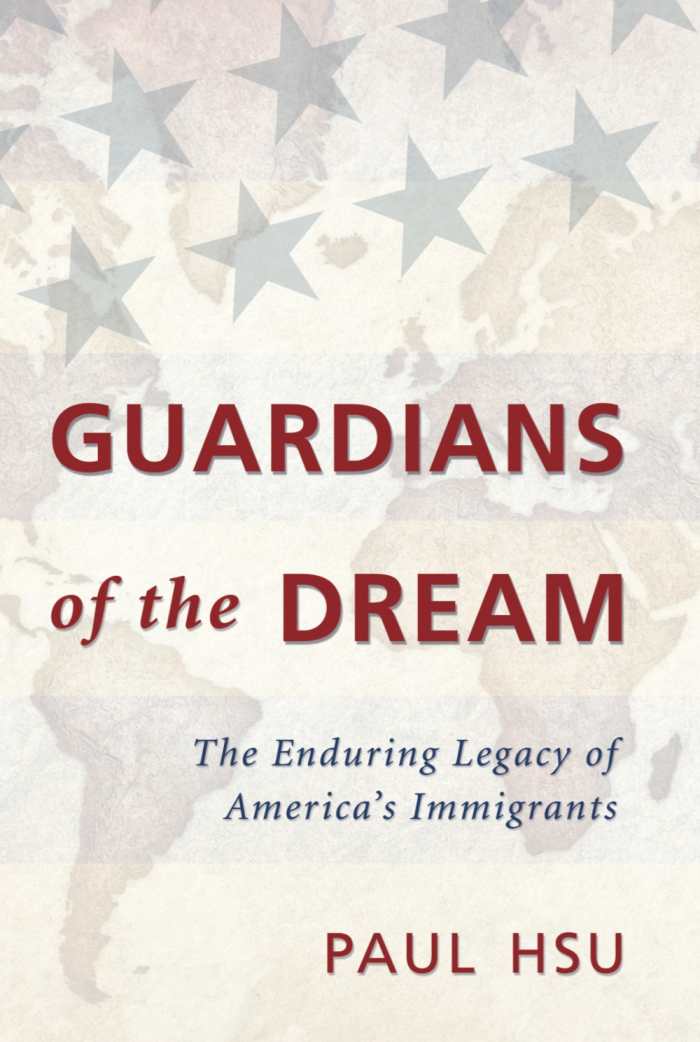
Paul Hsu
Maxwell Publishing
Hardcover $24.95 (192pp)
978-0-9860735-0-2
Buy: Amazon
An immigrant who has lived the American Dream tells his inspirational story in this finely crafted and well-timed book.
The recent focus on immigration reform in the United States has created a new awareness of immigrants; in some cases, inciting strong anti-immigration feelings. Paul Hsu’s inspirational and visionary book, Guardians of the Dream, is an important reminder that this country was founded by immigrants.
Hsu, an immigrant who came to the United States from Taiwan, is unapologetic about his belief in the American Dream. He laments the pessimism he sees expressed about America’s future: “We have our problems,” writes Hsu, “but when I listen to the complaints, especially from the younger generation, I sometimes feel that the real problem is not with America but in their own hearts…Amid this cacophony of dissent, the one group that says it still believes in America is immigrants.”
Hsu points to his own experience as proof that the American Dream is alive and well. He came to America with little money and spoke little English, yet he started several successful companies and invented products. Hsu was eventually appointed an associate administrator at the U.S. Small Business Administration and also won a national small-business award.
In one respect, Guardians of the Dream is a very personal memoir demonstrating one immigrant’s achievement of success through hard work and determination. Interestingly, the author says he was welcomed by Americans who supported and mentored him along the way. But Hsu digs deeper than his own experience. He also traces the positive impact immigrants have had on American history. He names some of the influential immigrants in the country’s history, including Alexander Graham Bell, Andrew Carnegie, Felix Frankfurter, and more recently, Indra Nooyi, CEO of PepsiCo, and Sergey Brin, cofounder of Google.
The author has keen insight into two qualities that make America great: innovation and the entrepreneurial spirit. He discusses, for example, how he acquired one company, ActiGraph, and turned it around by building an entrepreneurial attitude toward innovation: “In the past seven years or so, we have reengineered the product four or five times,” writes Hsu. “That’s how you’re always ahead of your competitors…New ideas and breakthroughs are encouraged. No one’s crucified for making a mistake. It’s all part of the process.”
Make no mistake, Hsu is a realist—he writes at length about America’s need to drastically improve the quality of education. He discusses, for example, the country’s deficiencies in STEM fields (science, technology, engineering, and mathematics): “While the technology sector has grown at four times the rate of other fields, student enrollment is not keeping pace,” writes Hsu. “Only about 15 percent of all college graduates have STEM majors or minors.”
Guardians of the Dream is well written and concise. It is also well designed, with an attractive cover and pleasing page design. The author includes several black-and-white family photos to personalize to his story even further.
In the last chapter, Hsu makes a passionate closing case by detailing six compelling reasons why he believes America is stronger than ever. His heartfelt eloquence is reason enough anyone would benefit from reading Paul Hsu’s well-timed book.
BARRY SILVERSTEIN (June 13, 2014)
Listen to the Children: Conversations with Immigrant Families
Escuchemos a los niños: Conversaciones con familias inmigrantes
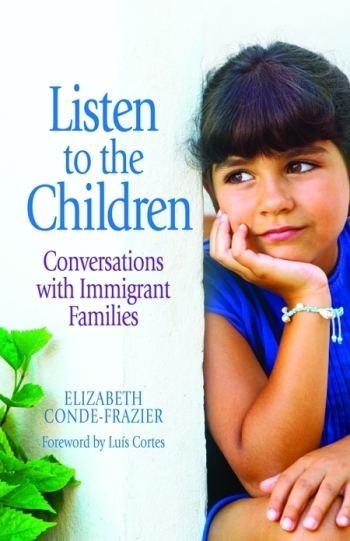
Elizabeth Conde-Franzier
Judson Press
Softcover $13.99 (128pp)
978-0-8170-1661-6
Buy: Local Bookstore (Bookshop), Amazon
One of every five children in the United States lives in an immigrant family today, according to The Brookings Institution. These youths face distinctive challenges that aren’t often addressed in the highly political, heated immigration debates of late.
As a pastor and immigrant advocate, Elizabeth Conde-Frazier brings a unique voice to the discussion. In this straightforward guidebook, she addresses numerous kinds of difficult issues in the immigrant experience, with a tone of gentle advocacy, warmth, and intelligence.
The fictionalized conversations she creates in her book showcase the common challenges felt by immigrant parents, their children, and caregivers. Adjusting to a move away from a community is always fraught with potential emotional problems, but for immigrant children, that transition is especially hard, since there may be language barriers, education shifts, legal status issues, and separation from a parent.
For example, the author points out that children of migrant laborers often suffer from a lack of attention because no one is home to provide consistent care. As a result, behavioral problems can emerge. She writes, “In the absence of one or both parents, shared values erode, emotional bonds deteriorate, and parental authority is affected.”
The book’s use of such scenarios helps to give context to other issues as well. For instance, one character describes being in a hospital with her mother, trying to translate information about another child’s emergency surgery. “I started to have this fantasy that I belonged to another family that understood English, and I could just be the child,” the character says. The situation is used as an example of the role reversals that often happen when language barriers occur, highlighting the frustration of children who have to bear the responsibility for making sure a parent understands.
Beyond helping those who work with immigrants, Conde-Frazier’s work will be valued by her subjects themselves, to gain better insight into the emotional and mental needs of their children around issues like separation, reunification of the family, and emigration from a homeland. Especially useful is the book’s bilingual text, with the same information presented in English and Spanish.
Listen to the Children is an excellent and much-needed addition to the literature on immigration, and gives immigrant children a new, clear voice that rises above the usual political and social conversations.
ELIZABETH MILLARD (July 7, 2011)
From Dirt Paths to Golden Streets
Poems of Immigrant Experiences
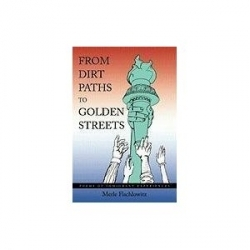
Merle Fischlowitz
AuthorHouse
Unknown
978-1-4520-8455-8
Buy: Local Bookstore (Bookshop), Amazon
The human transformation from immigrant to American is the focus of this lovely volume, which spans more than forty years of the poet’s profound, sensitive attention to people who arrived in the United States seeking refuge or pursuing “golden opportunities.”
The book begins with lyrical tellings of the experiences of European immigrants, stories that Fischlowitz heard from his Polish and Lithuanian grandparents and uncles, and others who adopted this country. The poem’s tone is gently gritty and deeply contemplative. “Soup,” which has been published in several other collections, describes how his wife’s cooking recalls the concentration camp that she escaped: she adds to the soup “a handful of pasta,/curved and stout as the women/whose pictures fill the photo albums/rescued from beneath the floor/of the bombed-out home.”
The piece called “Bagels” also uses food as an idiom for assimilation, depicting a family’s shift from Old World heavy dinners to a “modern, cholesterol-free/here-we-go-running-/into-the-21st-century/Southern California heat.//But we store bagels in our freezer/for a daily breakfast treat,/as one line of prayer/from a forgotten liturgy.” The sensations in this poem evoke the way immigrant families balance devotion to their heritage with adoption of new customs.
Later in this heartfelt collection, Fischlowitz turns his insightful attention to the struggles of immigrants from Latin America, Asia, and Africa. Here again he bases his impressions on personal contacts: He became friends with many immigrant families during his work as an educator and psychologist in Maryland, Hawaii, and his native Missouri.
These more hopeful poems are written in the voices of people who come to the United States seeking opportunities rather than asylum. Their tone is uplifting. For instance, in “Reach Tomorrow,” a girl arrives from Vietnam to join her husband. When the groom’s aunt apologizes for the traffic, the bride replies: “No!/In Saigon it’s worse than here […] In America you have big roads, much space/and room to reach tomorrow.”
Fischlowitz employs simple vocabulary and faint echoes of rhyme, and includes foreign-language terms with footnote explanations, embodying the way many immigrants retain their identity in a new world. His love for America shines through this exquisite book, with candle flames in darkness rather than spotlights on trumpets and flags. The poems build from specific representations of significant minutiae, like Sabbath candlesticks and baby clothes, to broad reflections like the importance of knowing one’s heritage in “Freed, Delivered, Redeemed,” and the transformative human magic to be found in “The Second Tongue”: “I reach to grasp the thought/cast in words I do not know or understand/and listen for the heartbeat,/the sigh, the gasp of breath,/that unexpressed ‘I’/which moved another’s pen to write/or mouth to speak.”
Especially now, when many Americans fear immigrants and laws begin to impose oppression rather than advance freedom, our nation can turn to these poems and be glad that Merle Fischlowitz’s heart and pen were moved to write.
KAREN MCCARTHY (February 1, 2011)
Observations of an Immigrant from Africa
Making the Cut in the USA
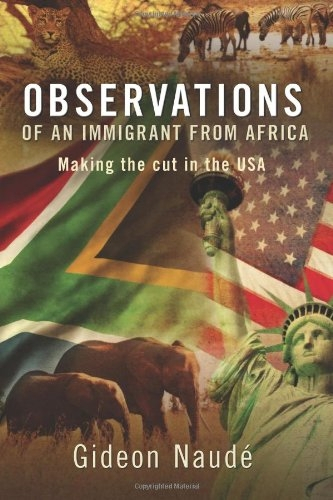
Gideon Naudé
CreateSpace
Unknown $19.99 (366pp)
978-1-4793-9339-8
Buy: Local Bookstore (Bookshop), Amazon
Sincerity and humor add insight to these dialogues on the immigrant experience.
This sixty-four-year-old doctor and father certainly has seen life from a number of widely varying perspectives. Born in South Africa, Gideon Naudé made the difficult decision to relocate his professional career and family thousands of miles across the globe. Observations of an Immigrant From Africa is an absorbing and original tribute from an outside perspective, with a host of entertaining anecdotes and curmudgeonly charm. This risk-taking memoir-cum-commentary will linger in the memory while honestly conveying the mixture of lively intellect, the desire for a good life, and the determination to help others that drew the author to the medical profession.
Having sacrificed a prosperous lifestyle, a secure and rewarding work life, as well as networks of extended family and friends, Naudé nonetheless has found a lot to like in his adopted home and believes firmly (and gratefully) that America really is “the land of the free.” However, he finds it disheartening that so many who grew up here—his “American” children included—either don’t appreciate the benefits of living in the United States, have never grasped how many others yearn for a similar degree of freedom, or simply take it all for granted.
Rather than write a straightforward manifesto, Naudé presents a series of true-to-life dialogues, some actual, some simulated, some composite, that he has had with various individuals, ranging from a chat on gun control to an exchange about welfare and benefits. This stylistic device could be cumbersome and distracting in less skillful hands, but, overall, the author is deft at keeping the narrative flowing. Imagine, if you will, a South African James Herriot who made his way to America and found much to like in its political principles.
Some more progressive readers might flinch at the author’s perspective on how misguided kindness and woolly notions of inclusiveness can damage society overall—sometimes, he purports, as much as malice or greed. However, the author’s flinty integrity and on-the-level style never gets shrill or crosses into polemical mudslinging. Furthermore, it’s refreshing to hear a medical practitioner’s take on his patients and fellow doctors alike, acknowledging equally the heroes and the duds. This work demonstrates that the good doctor is an excellent humorist with a knack for telling a story.
Idiosyncratic, unpredictable, and highly entertaining, Observations may be overlong on occasion, especially in the author’s recounting of his early professional years. Some of the background may have been better communicated through flashbacks or brief asides.
Naudé’s sincerity and willingness to poke fun at himself mean his discourse on America as a society is by no means a dry screed, as it contains quite a few laughs along the way. Parents will especially appreciate the accurate portrayal of banter between generations.
SEAMUS MULLARKEY (March 18, 2014)
We Became Mexican American
How Our Immigrant Family Survived to Pursue the American Dream
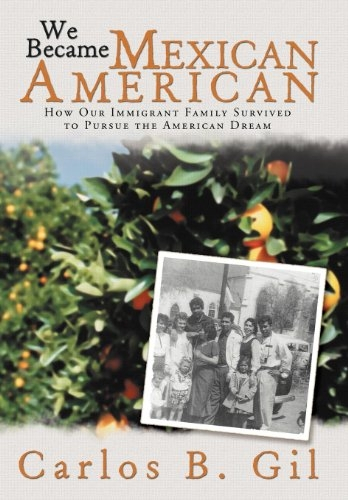
Carlos B. Gil
Xlibris
Softcover $23.99 (446pp)
978-1-4771-3654-6
Buy: Local Bookstore (Bookshop), Amazon
Memoirists routinely face the daunting task of sifting through family stories, trying to separate fact from fiction. Some authors decide the difference is insignificant and focus on one person’s subjective experience. Others objectively document family history with artifacts like marriage certificates and military records. In We Became Mexican American, Carlos B. Gil combines both methods to create a rich, textured portrait of his family from the time they immigrated from Jalisco, Mexico, to Northern California in the 1920s to the present.
Carlota, Gil’s grandmother, opens the story from Hacienda Santa Rosa, an agricultural estate where her family lived and worked as tenant farmers beholden to the landowners and the company store. With little chance of improving their situation in Jalisco, the Gils dreamed of escape. Stories of great opportunites in the United States convinced some to take the risk, including Carlota’s first son, Pascual, who led his family over the border and up the California coast in search of work, money, and security.
In order to tell the travelers’ tale, Gil uses details drawn from his extensive interviews with his aunts and uncles, the handwritten memoirs penned by his mother, and his own historical research. Gil’s scholarly expertise—he is an Emeritus Professor of History at the University of Washington—allows him to present a clear picture of the political and economic changes happening in the United States, starting with the Great Depression. Through his family’s experience as newcomers, he helps readers see the US through immigrants’ eyes. For instance, he describes their new world employing the Spanish words his grandparents used: vecindad for the Mexican housing projects and mezclilla for the ubiquitous blue jeans worn by workers.
Gil writes of an industrious father and selfless mother who did backbreaking work picking citrus and selling homemade tortillas around the clock to support their extended family, which included eight children. He does not portray them as perfect, however, allowing room for their mistakes. Gil remains a fairly neutral narrator even when discussing those closest to him, and while this detachment allows him to treat all family members equally, it can also create a disconcerting distance between himself and his subjects at times.
Even with four generations of an extensive family tree, Gil takes pains to explore the names and activities of each family member. His relatives will undoubtedly appreciate his thorough documentation, but the casual reader can easily lose track. That may be fine, though, for Gil’s message is about the overall arc of progress made by his family, not the individual experience of any one member.
We Became Mexican American shows how the hard work and determination of these Mexican immigrants led to greater economic success and higher social status with each generation. Black-and-white photographs inserted throughout the text vividly express this change of fortune. Early pictures show shirtless men aboard massive logging trains, while later photographs feature the fashionably dressed, smiling family with cameras around their necks, living the American Dream of prosperity at last.
SHEILA M. TRASK (November 14, 2012)
Color Me English
Thoughts About Migrations and Belonging Before and After 9/11
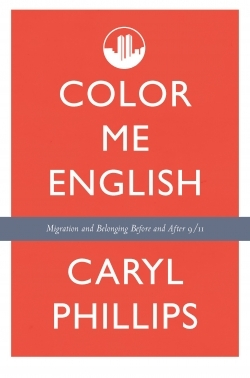
Caryl Phillips
The New Press
Hardcover $25.95 (352pp)
978-1-59558-650-6
Buy: Local Bookstore (Bookshop), Amazon
Novelist, playwright, and non-fiction author Caryl Phillips has been the “other” in several cultures: in 1950s Britain after his family migrated from St. Kitts; in the US, where he spends part of the year on the faculty of Yale University; and during his many travels and academic postings worldwide. In the introduction to his latest collection of essays, he confesses to feeling some “immigrant kinship” with the only other black boy, apart from his brother, to attend his school when he was young; but he also admits to ostracizing Ali, a Muslim who had the misfortune of transferring schools at the already awkward age of thirteen, and whom no one else there could seem to treat humanely, either. Phillips recognized his weakness in the face of peer pressure, as well as his own cruelty because, even then, he was as reflective as any good writer needs to be.
As a young writer Phillips believed that race was the most divisive factor in British society and because of this, whole classes of people were separated and misunderstood. Flash forward to the present: how much has changed? Examining his early years and those of others, he reveals an urgency to understand the immigrant experience across Europe, where the threat of terrorism can often be traced to a form of cultural disaffection he is able to both critique and understand.
“Twenty years ago, I felt as though I was striving to do two things simultaneously. First, I was trying to become a writer. Second, I was still engaged in a struggle to recognize and protect my own identity, in all its intricacy, for I knew I had to view it as unique, complicated, open to inspection and re-examination, and binding me not to just a particular tribe, clan or race, but to the human race.” Phillips traces his identity to its origins on the African continent, to the Caribbean, and to his present-day circumstances as a true cosmopolitan with multinational addresses and sensibilities, all of which positions him well to think about themes of identity, isolation, and belonging in a world circumscribed, however obliquely, by the events of September 11th.
Phillips’s prose is down to earth and unhurried; he wants to bring us along with him and feel welcomed into the conversation. The idea that the writer has a place in helping people to understand themselves seems to be the motivation behind all of these essays, from reflections on Chinua Achebe’s critique of Conrad’s Heart of Darkness to the music of Luther Vandross to the writings of other international literary figures he admires.
At its best, an essay feels inclusive, and that can be said of those in Color Me English. Phillips’s mode is one that arrives at insights, but gently; as readers we are privy to what he thinks and wonders about, and are inclined to join him in the process.
HOLLY WREN SPAULDING (April 28, 2011)
Hannah Hohman
